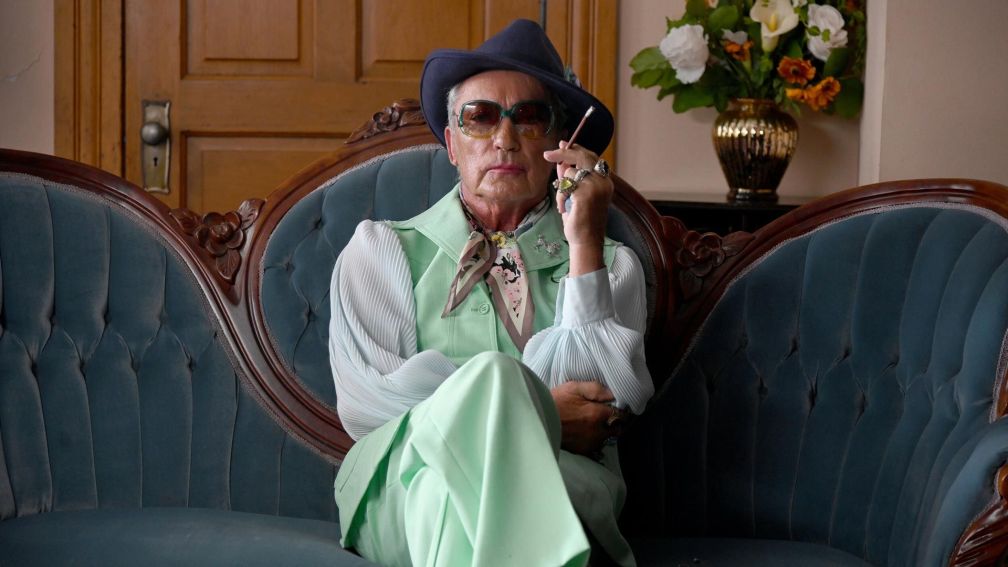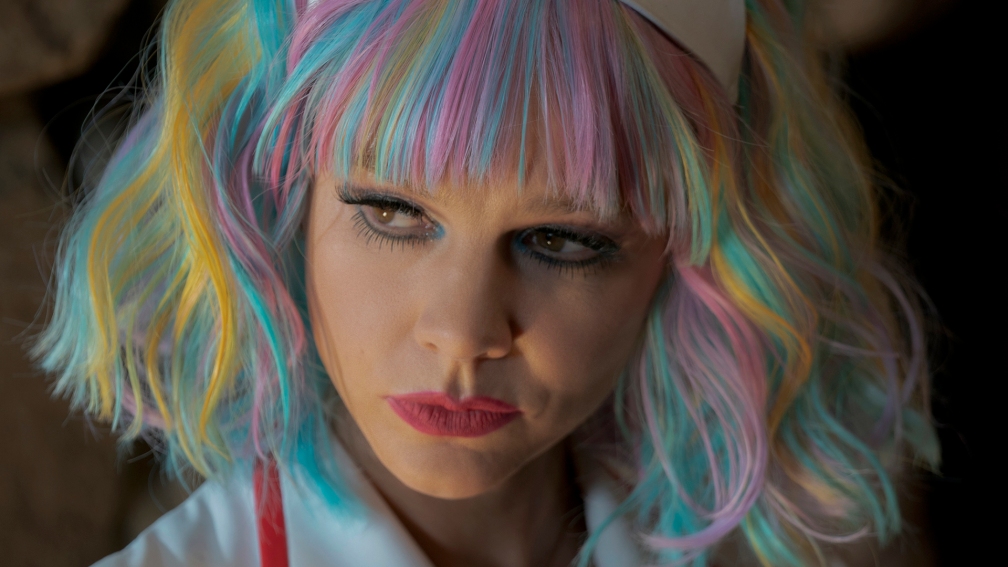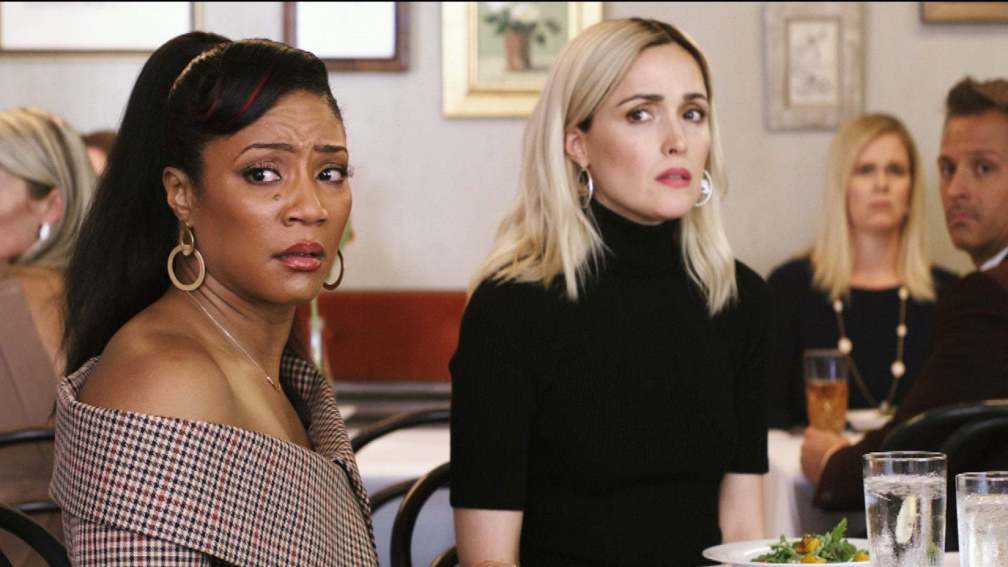Cast: Udo Kier, Jennifer Coolidge, Linda Evans, Michael Urie
Director: Todd Stephens
Writer: Todd Stephens
There’s a particular kind of actor, recognised and beloved by many, who spend decades-long careers just outside of the spotlight. Harry Dean Stanton was such an actor, whose career spanned six decades of supporting roles in hundreds of movies and shows, each one of which was made better by his presence, and only a couple of leading roles, both of them spectacular. He was 90-years-old when he made Lucky, and he couldn’t have asked for a better swan song. The profile also fits Udo Kier, a German actor who has appeared in over two hundred films and has worked with the likes of Werner Herzog, Rainer Werner Fassbinder, Dario Argento, Gus Van Sant, and, perhaps most notably, Lars Von Trier. At one point or another, you’ve seen Kier in something and been struck by his piercing gaze. Swan Song, directed by Todd Stephens, is a film that affords Kier a long overdue lead role so that he may show off the full range of his talents as an performer. It’s not the role you might have imagined for an actor who has so often been called upon to be menacing and unhinged, but he has always been a transformative performer and, whatever one thinks of the quality of this feature, is to be sure a worthy showcase for a singular screen presence.
Kier plays Pat Pitsenbarger, a real-life figure who was dubbed the ‘Liberace of Sandusky’, where Stephens is from. He’s a retired hairdresser now living a listless existence in a old folks’ home. While his hidden stash of cigarettes betrays a mischievous streak, he mostly looks like he’s just about given up and is simply spending his days wasting away. That is until lawyer Walter Shanrock (Tom Bloom) drops in for an unexpected visit, informing him that Rita Parker Sloan (Linda Evans), Pat’s most beloved client from his heyday, has died and that her last will and testament stipulated that he, and he alone, should be the one to do her hair and makeup for her final rest. Pat refuses at first, evidently there is a history of slights and grudges that he is still holding on to, but soon changes his mind in the face of the irrepressible boredom he otherwise faces as well as the prospect of performing one final hurrah. He escapes his nursing home and goes hunting for the beauty products and equipment he will need with the loose change in his pocket. The quest will lead many old familiar roads in a town that has mostly forgotten about him. Those that he knew during his glory days are either dead, like his partner David, or they’ve moved on, like his protégé Dee Dee (Jennifer Coolidge).
Pat is a curious specimen, made all the curiouser for being played by Udo Kier. Sundusky, Ohio, is a rural American town deep in a county that leans Republican, and in strolls this 70-year-old man with a German accent wearing a mint-green women’s suit and navy blue fedora with all the confidence and nonchalance of a movie star walking down Hollywood Boulevard. How such a man ever found his footing in such a place, we don’t know nor do we need to know. These kinds of small communities have their ways of finding their local characters. What we do learn is that for many happy years, Pat was the star beautician, the man all the women and wealth and status came to for their hairstyling needs. He was also a leading figure in the gay community, who co-founded a bar that became a refuge for his people at a time when they were desperately needed and where he performed his drag routine every Saturday night. Now, there is barely anyone who remembers him. His house, the one he wasn’t legally allowed to inherit when his partner died, was torn down, the bar is being sold so it can turned into a craft beer pub (“Where will people dance?” he asks disbelievingly), and his favourite commodities (cigarettes, clothing, hair products) are no longer in style. Little has changed on the surface, but it’s a completely different place.
The story is a digressive one that works best when focusing on the small details. Pat is especially focused on getting his hands on Vivante, a hairspray that was Rita’s favourite but has long since been discontinued. Pat walks into a Black hairdressers in search of it, loath as he is to go to Dee Dee’s where he is more likely to find some, and the scene that follows is demonstrative of how dismissive most people initially towards the curious old man who stands out like a sore thumb until they see how compelling he really is. It’s not just Pat though, it’s Kier in all of his distinctiveness. He’s the kind of actor who will give a line reading that nobody else would ever think to deliver. There’s nobody else who looks, moves, or emotes quite like he does. He visits David’s grave in one scene, the first time he’s ever seen it in person, and you’re suddenly caught off guard by his sudden powerful evocation of grief, not in a demonstrative sense but in the way it sneaks up on you when you weren’t prepared for it. Later on we see Pat recapture some of the old glory, strutting down the drag bar stage with a chandelier atop his head while lip-syncing to Robyn, and we see that his capacity for joy is just as potent. It is a truly remarkable performance.
Outside of Kier’s sublime turn, the movie is rather straightforward and occasionally vapid. The dialogue is very on the nose, stating outright in plain English what Kier has already done a formidable job of conveying with his multifaceted expressions, which makes the film feel more ordinary and obvious than what I feel like Stephens was going for. There is a recurring motif of Pat conversing with his departed acquaintances, appear before him as apparitions, and the effect is clumsy. Those scenes have none of the weight to them that Pat’s reunion with Dee Dee does; they trade snide jabs that amuse at first, but then after a while you start to feel the strain of their shared history come forth and their rapport gives way to something more bittersweet. There’s bitterness on both sides, but you can tell that these two once loved each other (I’ve never realised before what a good dramatic actress Coolidge can be with the right material). It’s in moments like that where the film really shines, and no aspect shines brighter than Kier, so full of life in every frame that you cannot help but be struck with awe. With his face at the centre (and what a face), he far and away outshines whatever lesser aspects might have detracted from a less impressive star. Whatever else viewers do or don’t take away from it, Swan Song shall always be an Udo Kier film.
★★★★


